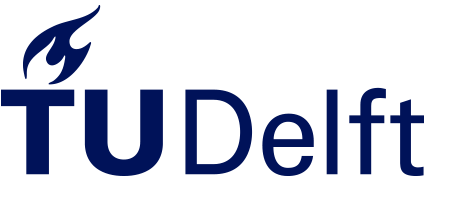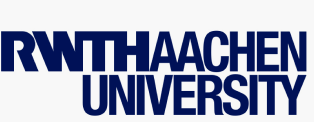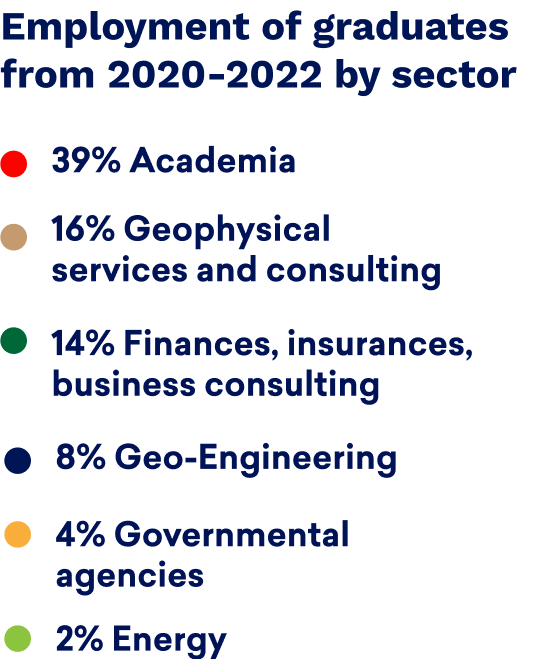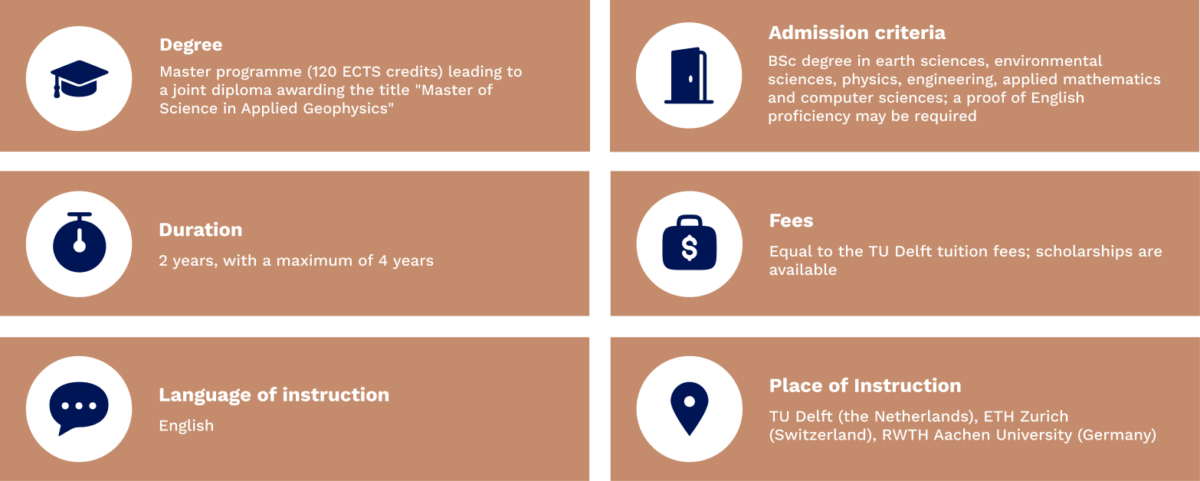Applied Geophysics
A unique international education in theoretical and practical aspects of Applied Geophysics
A unique international education in theoretical and practical aspects of Applied Geophysics
The Joint Master in Applied Geophysics is offered by three of Europe’s leading technical universities – TU Delft (The Netherlands), ETH Zurich (Switzerland), and RWTH Aachen (Germany). The two-year 120-ECTS programme brings together outstanding students with world-leading scientists in Applied Geophysics. You will be part of an international group of students with diverse backgrounds sharing the passion for exploring the Earth’s subsurface to address global sustainability challenges for our future.
Join us in working on a better future
Join us in working on a better future

Learning goals
The Applied Geophysics study and research programme equips students with an outstanding basis in mathematics, physics, and programming tailored to geophysical applications preparing them to solve global challenges for a sustainable future. Specific learning goals of the master programme are:
- Gain a quantitative understanding of geophysical phenomena, instruments, and sensing principles
- Engage in comprehensive training in mathematical and numerical tools
- Put theoretical knowledge into practice in hands-on exercises and field courses
- Explore the key application areas of Applied Geophysics
- Study in a global environment
Living and studying in different cities
Our Master’s programme offers students the unique opportunity to live and learn in three vibrant European cities and experience different cultures while studying. This unique mobility experience enhances our students’ prospects for pursuing careers in competitive global industries.
Programme overview



Year 1, September – January
TU Delft’s principal research strength is geophysical methods for subsurface characterization and monitoring of subsurface processes.


Year 1, February – June
ETH Zurich’s principal research expertise lies in exploration, engineering, and environmental geosciences as well as geothermal energy.


Year 2, October – February
RWTH Aachen’s principal research strengths are geothermal energy, numerical methods, hydrogeophysics, and scientific machine learning.
Curriculum and themes
The curriculum covers the physical, mathematical, computational, as well as data analysis foundations of Geophysics with an emphasis on methodologies and applications. Key skills are taught in compulsory courses, along with a broad range of electives that allow students to dive into topics of their interests. An overview of the courses for 2022-2024 can be found here
Core competencies conveyed during the course of study:
Geophysical sensors and data acquisition
Field-based research and education plays an essential role at all three partner universities.
Example lectures:
- Field Geophysics and Signal Analysis with Exercises at TU Delft
- Geophysical Fieldwork and Processing at ETH
- Geophysical Logging and Log Interpretation at RWTH Aachen
Inversion of geophysical data, signal processing, numerical methods, and machine learning
Researchers at all three partner universities conduct pioneering research in geophysical data modelling and inversion as well as their application to real-world problems.
Example lectures:
- Advanced reflection seismology and seismic imaging at TU Delft
- Inverse Theory I & II and Numerical Modelling for Applied Geophysics at ETH
- Machine Learning at RWTH Aachen
Societally relevant applications
All three partner universities are at the forefront of developing and teaching geophysical techniques to solve global problems of high societal relevance.
Example lectures:
- Geology for Geo-Energy at TU Delft
- Geothermal Energy and Geofluids at ETH Zurich
- Hydrogeophysics and Engineering Geophysics at RWTH Aachen
Career Prospects for a Sustainable Future
Graduates of the Joint Master in Applied Geophysics work in a wide range of companies and government institutes in the energy, civil engineering and environmental sector. The quantitative nature of the studies opens more possibilities outside geophysics, in for example, financial institutions, insurances and consultancy agencies. Many graduates also continue a research path in PhD research programmes in various parts of the world. View the more detailed infographic here or visit the Alumni & Career perspectives page for more information.


“What initially drew me to this master’s program was the unique opportunity to receive education from three distinguished universities, each offering their own specialized expertise, across different countries. Each semester, spent at a different university, has provided me with a diverse set of skills and knowledge that I would not have acquired by staying in one place. ”
“I truly believe that the IDEA League programme had a severe contribution to becoming a co-founder of a seismic service company in the energy industry after my graduation. In my role as a Technical Director I get to work with current students regularly as part of their graduation projects. ”
“The IDEA League Joint Masters program offers opportunities that reach beyond excellent lectures and state-of-the-art knowledge. You get to know many people and you make friends, which helps in forming a professional and support network that may shape future paths and sets a firm ground to build your career.”
“The IDEA League Joint Masters program offers opportunities that reach beyond excellent lectures and state-of-the-art knowledge. You get to know many people and you make friends, which helps in forming a professional and support network that may shape future paths and sets a firm ground to build your career.”










